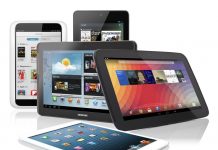 Dan Bloom is a freelance writer and occasional TeleRead contributor who’s been living in Taiwan for more than 15 years; he’s also an author and a climate activist. Over the weekend, Bloom sent me a link to his most recent piece for The China Post, and because it covers a fascinating and potentially important e-reading topic I haven’t read much about, I wanted to share it here.
Dan Bloom is a freelance writer and occasional TeleRead contributor who’s been living in Taiwan for more than 15 years; he’s also an author and a climate activist. Over the weekend, Bloom sent me a link to his most recent piece for The China Post, and because it covers a fascinating and potentially important e-reading topic I haven’t read much about, I wanted to share it here.
The meat of Bloom’s article starts in the fourth paragraph, where he proposes the question of “whether reading on screens is the same experience, in terms of brain chemistry, as reading text on paper surfaces.” Here’s more from that same article:
“This is an important issue that the tech industry here in Taiwan and in global society as a whole has so far not faced up to. What I believe—and what leading experts in the field such as Anne Mangen in Norway and Maryanne Wolf at Tufts University also suggest—is that the fundamental differences between paper-reading and screen-reading might be so big as to light up different regions of ‘the reading brain,’ and that these differences need to be studied more, especially with (f)MRi and PET brain scan research.”
As far as his own opinion is concerned, Bloom has this to say about the subject:
“I have a hunch, based on a lifetime of reading on ‘paper’ and just 15 years of reading off ‘screens,’ that reading on paper surfaces is vastly superior in terms of brain chemistry for three important issues: the brain’s processing of the text being read, the brain’s retention of the information, and critical analysis of the information.”
And while Bloom certainly doesn’t claim to be a scientist or doctor of any sort himself, a number of professionals who’ve said essentially the same thing have popped up in the media over the past few years. The Tufts University child development professor Maryanne Wolf, for instance, covered the issue at length in her 2008 book, Proust and the Squid: The Story and Science of the Reading Brain. (Which, appropriately enough, does not appear to be available as an e-book!)
As for myself: I can’t honestly say I’ve formed an opinion one way or the other just yet. I haven’t read Wolf’s book, nor have I read any studies on the issue that may have appeared in academic journals. What I can say, though, is that I will surely be seriously disappointed if any of these hypothetical theories turn out to be even somewhat accurate. I’m an anxious person by nature, and I can only imagine how guilty I’d feel reading an e-book that was also available in print, and knowing that my level of retention was suffering because of my preferred method of content delivery.
And yet, even if it is one day proven that paper-reading is brain-chemically superior to screen reading, I suspect the increased level of its superiority will be so small and slight as to be inconsequential. But then again, what do I know about the brain? (Answer: Not much.)
To explore the issue a bit further …
- Start with this 2009 feature from the Christian Science Monitor …
- … which was mentioned in this TeleRead post by former editor Paul Biba. (Read this post’s comments, as well.)
- You’ll also want to read the Q&A interview Dan Bloom conducted three years ago with Dr. Anne Mangen, who at the time was a reading specialist at the National Centre for Reading Research and Education at Norway’s Stavanger University.
- From Txchnologist, check out this thoughtful Q&A interview with Dr. Mangen, which was published in December 2011.
* * *
Update: Because I think it’s vitally important to give equal face time to both sides in a debate such as this one, I wanted to include a couple paragraphs I just noticed from Dan Bloom’s aforementioned 2009 interview with Dr. Anne Mangen. In the quotes that follow, Dr. Mangen seems to be suggesting that screen-reading and paper-reading are simply different experiences, as opposed to one method being better than the other. Personally, that’s an opinion I can get behind.
From the blog of author and expat Dan Bloom:
“When I mentioned to Dr Mangen that my concept behind using the word ‘screening’ to try to capture the fact that the experience of reading on a screen is fundamentally different from reading on paper—not worse or better, just different—she agreed, saying: ‘Yes, the experience of reading on a screen is different from reading on paper; although in what ways and to what extent must be specified in each instance, situation and purpose of reading.’
“But she added: ‘However, whether reading on a screen is better or worse than reading on paper depends on a range of variables—the reader’s prior experience with both formats, the purpose and situation of the reading act, the type and genre of text, the disposition of the reader, and other variables.'”

































This sounds pretty damn sloppy to me. He doesn’t even define what he means by “screen” (LCD or e-ink? Phone-sized, Kindle-sized, or iPad-sized?). Furthermore, who is to say everyone will have the same results? I know my daughter-in law loves reading on her Kindle because she is dyslexic and making the words bigger makes them much easier for her to interpret correctly.
I still say, if the author is doing his/her job, you concentrate on what you’re reading and forget what you’re reading ON.
This guy has a hunch? Show me a real study with real results and we’ll talk.
Carmen: I’m not sure if any studies have actually been done, but if they have, I’d suspect they’re probably mentioned in “Proust and the Squid”. Has anyone read the book, and if so, do you remember if Wolf focuses specifically on any reading studies?
Let’s hope another five years or so will see the end of this nonsense. It’s probably about the equivalent of questioning whether reading on a scroll is different/better than reading on a wax tablet.
In addition to Carmen’s comment, there is also a difference between reading on a computer monitor that you look at sitting up, eyes more or less looking straight ahead, or a screen that you hold similarly to a book. I, for one, only “scan” (maybe this is what he actually means with “screening”) content on my laptop monitor, and never seem to be able to concentrate and immerse in it, while I can spend hours reading on my iPad, Nexus 7 and especially my Kindle 4.
There is, however, one undeniable difference: when you hold a paper book, the tactile feeling differs from book to book – some may be embossed, some may be leather bound, heavy or light, large or small, glossy paper or recycled. Additionally, smells and fonts differ and the cover and cover art are something you notice when taking a break from reading it. This MUST be affecting the brain chemistry.
Also, I know a few people who can’t, out of the top of their head, tell me what ebook they are reading, myself included. Sometimes, the title and/or autor escape me and I have to check. When I read paper books, I don’t have to, as I always see the title and author in cront of me.
So, indeed, for the above stated reasons, I do retain more information when reading dead tree books vs. ebooks on tablets and ereaders. But is this extra information essential?
A bunch of hooey. There may be something to LCD screens being harder on your eyes, but reading on a book-sized eInk screen is no different than reading a paper page.
Also, as carmen says, many people have been given back the gift of reading because of the technology – larger print, minimum motion for “turning the page”, or read-to-me.
Just to repeat what I said over on Dan Bloom’s blog:
As someone who has been ereading for over 10 years on a plethora of different devices and screen formats, I can tell you that the idea that reading on a screen is somehow bad for your brain chemistry is nonsense.
Stuck in Hong Kong, I was able to access the whole range of Gutenberg classics, instantly, for free. I spent far more time reading than I otherwise would have done, because I could carry my library with me everywhere and read it anywhere. I immersed myself in the great literature of the past to a far deeper extent than I would ever have done if I had been dependent on what paper books I could buy and carry around. My knowledge, thought processes, and creativity – I’m a writer – were all immeasurably enriched by ereading. And that is what the act of reading is about, in any medium.
Dan to Dan, you wrote a very good intro post to my oped and I liked the balanced approach, and yes, I agree with Dr Mangen, that reading and screening just might be different experiences, not superior or inferior. I agree with her and always have. As for those above who say about my ”hunch”– ”Show me a real study with real results and we’ll talk.”
Carmen, that is why I wrote the piece. I also want to see these studies, and until then my hunch is just that a hunch. That’s what hunches are for. I hope I am wrong, in fact, but my hunch pushes me to keep asking the questions. As for any current MRI and PET scan research going on, on this, NOPE! I have asked Gary Small at UCLA and Mangen and Wolf at Tufts (my alma mater, class of 71) and they all told me
1. the subject is not sexy enough to get any funding for research from govt or universities
2. the subject would cost too much money to undertake, what with MRI machines and PET scans, and all in pursuit of a hunch that might be completely wrong, so why do it?
3. most reseachers’ plates are already full with studies and nobody wants to go down this road, see answers 1 and 2 above.
SIGH
My guess is that we will have some real PHD research on this, the reading brain and brain chemistry re paper reading vs screen reading by……2025 AD. I will be dead then, carry on, folks. There’s some interesting data to be mined here. But there’s a good chance the differences, if any, will be so small, as to be negligible. I agree with Dan. On the other hand, what if I am right? Ouch.
My main impetus in writing this oped is not to say I am right, look at me, la la la, but to prod some researchers somewhere to undertake this kind of expensive unsexy study. Does anyone know of any group doing such research yet? All my sources say nobody is doing it and nobody will ever do it, as too expensive AND…..drum roll….how to get a computer screen or Kindle into an MRI machine, without it exploding? metal on metal?
Paul StJohn Mackintosh in Hong Kong read this and disagreed, telling me:
”As someone who has been ereading for over 10 years on a plethora of different devices and screen formats, I can tell you that the idea that reading on a screen is somehow bad for your brain chemistry is nonsense.
Stuck in Hong Kong, I was able to access the whole range of Gutenberg classics, instantly, for free. I spent far more time reading than I otherwise would have done, because I could carry my library with me everywhere and read it anywhere. I immersed myself in the great literature of the past to a far deeper extent than I would ever have done if I had been dependent on what paper books I could buy and carry around. My knowledge, thought processes, and creativity – I’m a writer – were all immeasurably enriched by ereading. And that is what the act of reading is about, in any medium. ”
It would be interesting to know if the author refers to pure text or text with charts, graphs, illustrations, etc. I have been reading on a Kindle for almost 5 years now, mostly straight text, and my subjective experience does not show any lack of retention for what I want to keep. A study would have to take into account the amount of reading done. For instance, would retention be better for someone who only reads 5 books a year as opposed to 150? And does the 150 book reader really WANT to remember every detail?
I just don’t see the logic behind it. When we read, we register the shapes of the letters and translate them to the significanses we learned once. And we reflect upon the meaning of the text. How this would be affected by the way those letter-forms were created is a mystery to me.
Also I wonder where an E-ink screen would stand in this. Is it more like a Screen because it’s changeable, or more like paper because it’s not backlit?
Cognitive science is not silent on comparative screen/print reading. Their discipline is based in brain functions and constructs of memory, memory encoding and planning activities that characterize human perceptions. Books are a very recent prosthesis of conceptual works encoded to devices and they are specifically refined to augment the busy mind.
An interesting aspect is the extra-bodily nature of books even though they effectively encode conceptual works of the mind. Onto that issue can be added distinctions such as screen or paper display and many other sub-distinctions of these.
Books influence memory and retention, especially in recursive construction of concepts. This can be illustrated with the evolution of language; we do not use a word once. The meaning builds as we use a word again and again. Books actually become especially important in long-term meaning where concepts are relayed across time and cultures.
Here one factor, not quickly disputed, becomes important; screen-reading devices are libraries as they display many books while a print book displays only a single title. Recursive transmission is facilitated with objects such as paper book. They provide an immutable display of a single conceptual work and are authenticated as such. This strange, almost paradoxical, efficiency (extreme DRM if you will!) helps to explain reliance on paper books.
Screen books also present extra-bodily display of conceptual works, but the displays are actually as variable, transient, interrupted and conglomerated as our busy minds. This is why students avoid learning risks presented by screen textbooks.
Maybe years of watching TV have conditioned us to store anything we see on a screen in short term memory.
Here’s a review of Proust and the Squid:
http://www.guardian.co.uk/books/2008/apr/12/featuresreviews.guardianreview21
Although I suspect that this is a collection of ill-founded assertions, I have to qualify that with the observation that precious little objective research has been done to understand the differences, if any, between the content of eBooks and pBooks. It’s only been very recently that eBooks even approached the availability of pBooks. There’s just not enough data.
It is certainly a worthy topic since it seems that pBooks will, if only for economic reasons, soon be a distant memory.
Show the data: print publishing revenue finances screen formats. That ranges from university presses to Wired magazine where e versions are enabled by print revenues. In terms of units sales they will stabilize at 60% print to 40% (not yet 20%) screen. In terms of revenue 3/4 print for 1/4 screen. I am not factoring device sales which is a consumer electronics issue rather than book publishing.
Mary above, good questions and I also don’t know the answers. And Frank re ”I have to qualify that with the observation that precious little objective research has been done to understand the differences, if any, between the content of eBooks and pBooks [SINCE] it’s only been very recently that eBooks even approached the availability of pBooks [and] there’s just not enough data. ” SO YES: ”It is certainly a worthy topic since it seems that pBooks will, if only for economic reasons, soon be a distant memory.”
LET THE MRI AND PET SCAN research begin! Come what may.
And let me be wrong! I want to be wrong!
Interesting that I came across this just now – I just read today, in a book intended for higher-ed teachers who want to improve their students learning processes, that there’s evidence (from 89 and 96) suggesting that people read 30% slower when they read from a screen rather than from a page. So people interact visually in different ways in the two kinds of cases.
This suggested to me that there might also be evidence, though it wasn’t presented in this context, to think that people might not be doing the same kind of congizing (not a word) when they read from a screen rather than from a page… The research you cite above seems to confirm this notion.
I guess it’s not surprising. I seem to read MUCH slower and less effectively in general when I read from a screen.
(The book I note above is Terry Doyle’s “Helping Students Learn in a Learner-Centered Environment:…” from 2008)
(I had the same question as someone above – I wonder how the screen-reading research translates to the E-ink on Kindles?)
Retweeted by canadian novelist and sci fi maven margaret atwood, whose brother is a neuroscientist
@MargaretAtwood
”Is E-Reading Bad for the Brain? ‘– teleread.com/e-readers/the-… etc
I would guess that “reading from a screen” in that case refers to a computer screen or the like. For me, reading from an e-ink screen is better than from a printed page because there is less hassle in all things, page turning, etc, and I can make the font whatever size I need it to be for comfortable reading. I am probably reading more books now on my Kindle than back when I was reading paper books.
@Mary, I see your point too and it makes sense, too. Reading on paper or screens is a personal matter, sure. What we need to find out from hard science, neuroscience, is if different regions of the brain light up for paper reading compared to screen reading, and which regions and any difference? Perhaps same regions and no difference. Perhaps different regions and big difference. We need the MRI and PET scan mavens to weigh in on this.
As one of the top researchers and writers in this field just emailed me after reading Dan Eldridge’s post above said to me:
””Thanks so much, Dan Bloom, for sending TeleRead piece on! ***How I wish we all had the real evidence we need to make better, more informed judgements.***”
Kindest wishes to you , PHD scientist looking into this too.”